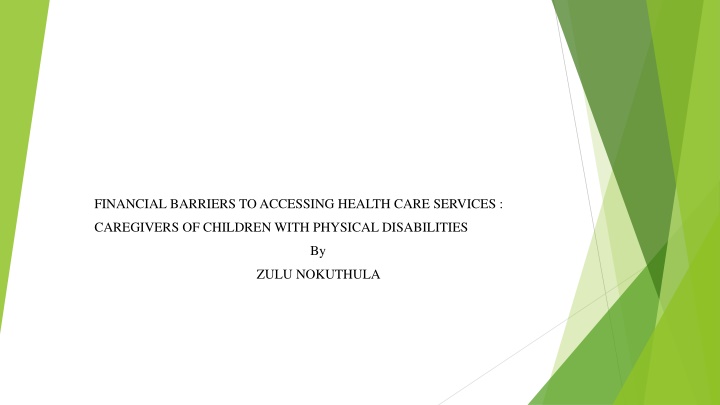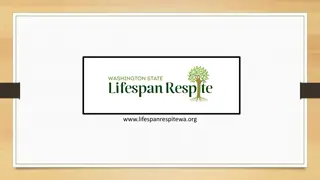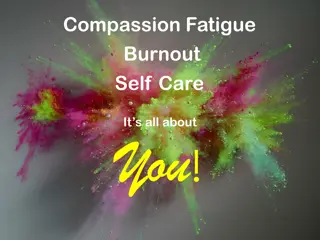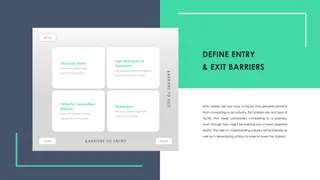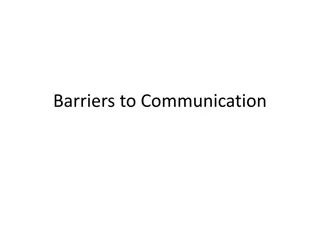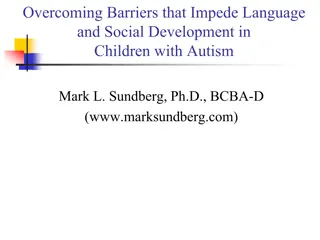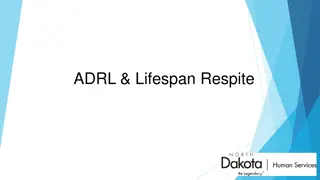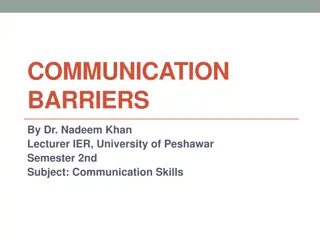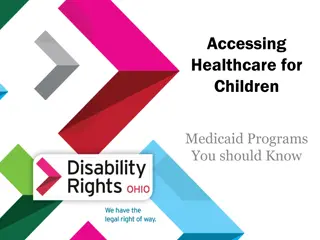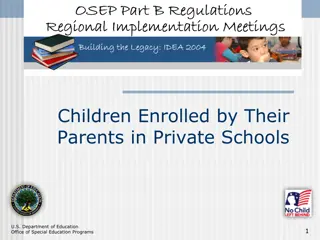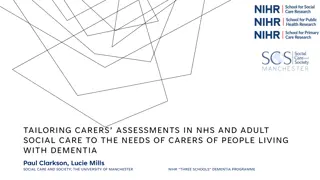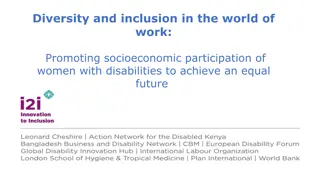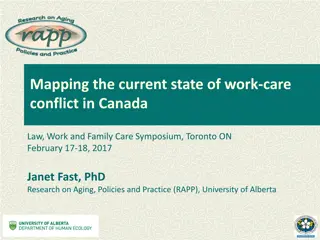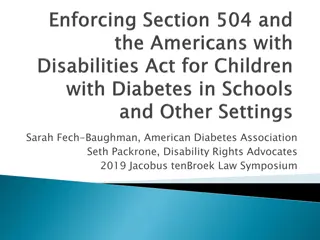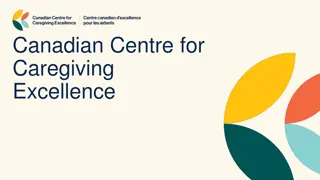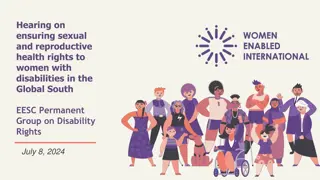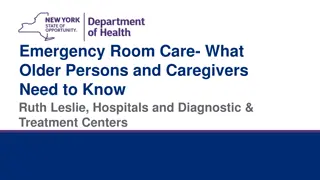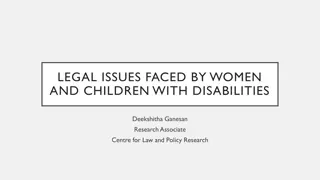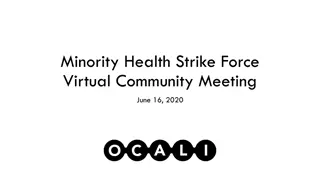Financial Barriers to Accessing Health Care Services for Caregivers of Children with Physical Disabilities in South Africa
Chapter 2 of the South African Constitution guarantees fundamental rights to all citizens, including children with physical disabilities. This presentation explores the challenges faced by caregivers of such children in accessing healthcare services, examining legal instruments, study methodology, findings, and recommendations. Issues of stigma and lack of support are highlighted, emphasizing the need for improved access to healthcare for this vulnerable group in South Africa.
Download Presentation

Please find below an Image/Link to download the presentation.
The content on the website is provided AS IS for your information and personal use only. It may not be sold, licensed, or shared on other websites without obtaining consent from the author.If you encounter any issues during the download, it is possible that the publisher has removed the file from their server.
You are allowed to download the files provided on this website for personal or commercial use, subject to the condition that they are used lawfully. All files are the property of their respective owners.
The content on the website is provided AS IS for your information and personal use only. It may not be sold, licensed, or shared on other websites without obtaining consent from the author.
E N D
Presentation Transcript
FINANCIAL BARRIERS TO ACCESSING HEALTH CARE SERVICES : CAREGIVERS OF CHILDREN WITH PHYSICAL DISABILITIES By ZULU NOKUTHULA
OUTLINE OF THE PRESENTATION Introduction Legal instruments Study Area and Methodology Research Design Data Collection and Analysis Ethical considerations Findings Recommendations Conclusion
INTRODUCTION Chapter 2 of the Constitution ensures the fundamental rights to all citizens of South Africa Child: The African Charter on the Rights and Welfare of the Child (ACRWC) defines the child as every human being below the age of 18 years. World Health Organization (WHO) define physical disability as any impairment which limit the function of limbs or fine or gross motor ability. Other physical disabilities include impairments which limit other facets of daily living. The birth of children is a gift and a blessing in the family and it is celebrated with joy. However, once the family realizes that their child has a specific disability requiring treatment, that may dim the joy of a family. The birth of children with physical disabilities comes with more responsibilities when it comes to parenting or taking care of the children as compared to parenting or taking care of children without any physical limitations (AlDababneh, Fayez & Bataineh, 2012).
INTRODUCTION CONTINUES Some of the family members distance themselves from taking better care of children with special needs, as they perceive the children or family as being cursed or the disability as being caused by witchcraft (Rugoho & Maphosa, 2017; Cowles, 2003, cited in Mathebane, 2016; Mckenzie, McConkey & Adnams, 2013). Children from ages 0-5 years were not included in the Stats SAprofile on persons with disabilities but children from 5-9 years are stated to constitute 10,8%, 10-14 years 4,1 % and 15-19 years 2.6% of the whole population.
LEGAL INSTRUMENTS Constitution of the Republic of South Africa (1996) Children's Act 38 of 2005 National HealthAct 61 of 2003. Promotion of Equality and Prevention of Unfair Discrimination Act 4 of 2000 (PEPUDA) Social Assistance Act 13 of 2004 United Nations Convention on the Rights of Persons with Disabilities (CRPD), United Nations Convention on the Rights of the Child (CRC), African Charter on the Rights and Welfare of the Child (ACRWC)
STUDY AREA AND METHODOLOGY The empirical study was conducted in Nongoma area (Nongoma District Municipality), KwaZulu-Natal (South Africa). The study was conducted at Nongoma Local Municipality, which consists of 21 wards with 42 councillors and three Traditional Councils, which are Usuthu, Matheni and Mandlakazi. Generally, the area of Nongoma is regarded as the location of the Zulu sovereign. The researcher used primary data. The database of parents was obtained from the social worker working for a Non-Profit Organization (Mzamo Child Care Guidance & Training Initiative of KZN), dealing with children with disabilities situated at Prince Mshiyeni Memorial Hospital off Mangosuthu Highway, Umlazi, and with satellite offices at eThekwini and iLembe and Zululand Districts. There is one satellite office at Nongoma under the Zululand District.
STUDY AREA AND METHODOLOGY There are two hospitals close to Nongoma town; one is a public hospital (Benedictine Hospital) and the other a privately-owned hospital (Philani Hospital). Large parts of the population in Nongoma Municipality are more than 90 minutes' travel time from a hospital facility. There is a total of 18 clinics and the backlog of clinics has been determined to be 33.
RESEARCH DESIGN The study employed a qualitative research approach. Both exploratory and descriptive research used Sample and sampling strategy Both purposive or judgmental and snowball sampling were used. The study consists of 10 females caregivers and children with physical disabilities between the age of 5 and 14
DATA COLLECTION AND ANALYSIS Semi-structured interviews were conducted. Semi-structured, open-ended questions and observation enable respondents to express thoughts naturally and act accordingly. Data were obtained from the caregivers taking care of the children with physical disabilities, who have first-hand information regarding the financial barriers to accessing health care services. The data were analyzed through thematic analysis since this is perceived to be the best suitable method for ascertaining information which is sought using analysis. An interview guide consisting of a list of open-ended questions was utilized in order to obtain lengthy responses.
ETHICAL CONSIDERATIONS Voluntary Participation-The researcher allowed the principle of self-determination for participants to engage freely in the study Informed Consent-Written consent was obtained from the participants and was done under ethical clearance section. Consent was received as written consent, signed by participants Protection of the Autonomy of the Participant- Precautionary procedures were put in place to safeguard participants experiencing traumatic or stressful life circumstances. Confidentiality, Privacy and Anonymity-Participants (caregivers) were given the assurance that their identity would be kept anonymous since they would be named Caregiver A, Caregiver B and so on. There would be no right to use to confidential information without prior consent of participants. No Harm- No participants had to perform an act that undermined self-esteem or induced guilt, humiliation, or disappointment
FINDINGS Social Grant-Caregivers report that the social grants are insufficient to cater for the children's needs. Expenses-Caregivers experience and incur high transport costs for the children's health visits. Absence of assistance-Caregivers experience a lack of support in meeting their caregiving responsibilities. Unattainability of mobility aids-Caregivers experience challenges with access to assistive devices for the children. Care burden-Caregivers experience a high burden of care and financial worries.
RECOMMENDATIONS -Disaggregated statistics by disability It is recommended that the South African statistics collected should be specific in stating the number of children with physical disability per municipality( this is known as disaggregation ) The Department of Health should conduct their statistics based on figures per clinic or hospital to indicate the number of children with physical disabilities in different areas -Improvement of health care services The Department of health is advised to strengthen the consistency of medical care given to children with physical disabilities An increment of the budget allocation is needed to improve service delivery and to lessen the financial burden to caregivers visiting health care facilities several times without receiving proper assistance -Appropriate assistive device allocation It is recommended that the Department of Health should refrain from issuing assistive devices depending on the 'one-size-fits-all' method. The provision of assistive devices should be prioritised and enough budget should be assigned for it to decrease the extreme inadequacy of government assistance to children.
RECOMMENDATIONS CONTINUES FinancialAssistance with Travel to MedicalAppointments It is recommended that the Department of Transport should make it a priority to remove the barriers to public transport that hinder accessibility to public transport and also to provide transport that will accommodate children who are physically disabled, including their assistive devices. Future Research It is also recommended that further study about the biological fathers of the children with physical disabilities in supporting their children should be conducted. A study considering the role of men including the barriers they face would also be useful in future study DisabilityAwareness andAnti-discrimination Training The responsibility lies upon South Africa under its international law obligations to prioritise and provide training to people in the communities on how to treat persons with disabilities without discrimination.
CONCLUSION The study concludes that the financial barriers faced by caregivers are the cost of transport to and from hospital or clinics to access health care services such as the original and progressive assessments, attending physiotherapy and a session with a dietician. In many cases, difficulties in getting to the clinic or hospital result in the caregivers missing the important sessions. It was mentioned that sometimes the caregivers are compelled to pay a double amount on public transport or pay a large amount to hire private transport. Caregivers face financial struggles in accessing health care services for the children.
CONCLUSION CONTINUES The out-of-pocket costs for medical services to children include, for example, instances when caregivers buy medicine for the disabled children at a private pharmacy. It was also concluded that there are financial burdens resting on caregivers when trying to apply for the care dependency grant on behalf of children with disabilities since they have to undergo medical assessments. Other costs incurred include special foods and nappies for the children. All of these necessities must be considered as financial barriers to accessing health care services faced by caregivers caring for children with physical disabilities in Nongoma.
